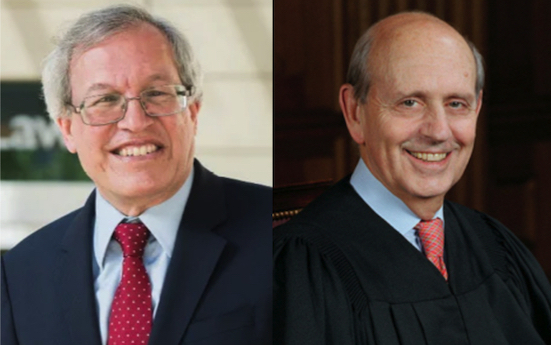Chemerinsky op-ed calls on Justice Breyer to retire now

Law dean Erwin Chemerinsky and U.S. Supreme Court Justice Stephen G. Breyer. Photo of Chemerinsky by Jim Block.
U.S. Supreme Court Justice Ruth Bader Ginsburg didn't heed calls to resign when law dean Erwin Chemerinsky wrote a March 2014 op-ed making that plea.
Now, Chemerinsky, dean of the University of California at Berkeley School of Law and a frequent ABA Journal contributor, is asking Justice Stephen G. Breyer to retire and pointing to Ginsburg’s failure to do so as instructive.
Ginsburg died about two months before the presidential election last year, but the then-Republican-controlled U.S. Senate quickly confirmed former President Donald Trump’s conservative nominee, the now-Justice Amy Coney Barrett.
“Breyer shouldn’t even wait for the 2022 midterms to retire,” Chemerinsky recently wrote for the Washington Post. “With a 50-50 Senate, anything is possible: Something could happen to a Democratic senator in a state with a Republican governor, who would then pick the replacement and throw the majority back to Republicans.”
Chemerinsky said replacing Breyer with a liberal justice would still require the other liberal justices to attract two conservative justices to gain a majority. But replacing him with a conservative justice would make the task even more difficult, with three conservative votes needed.
Chemerinsky acknowledged important contributions and pointed out that Breyer wrote these major opinions:
• The June 2016 majority decision striking down two provisions of a Texas abortion law in Whole Woman’s Health v. Hellerstedt. One provision required physicians performing abortions to have admission privileges at a hospital within 30 miles. The other required abortion facilities to comply with hospital-style standards for ambulatory surgical centers.
• A dissent in the June 2015 decision Glossip v. Gross that said it is “highly likely that the death penalty violates the Eighth Amendment.” Breyer said constitutional defects include the death penalty’s “serious unreliability” as shown by exonerations, arbitrariness in application of the penalty, and “unconscionably long delays” in carrying out capital punishment that undermine its penological purpose.
• A June 2007 dissent in Parents Involved in Community Schools v. Seattle School District No. 1 that urged empowering the government to end de facto school desegregation.
Breyer “has a pragmatic approach to judging that looks more to real-world effects than abstract ideology,” Chemerinsky wrote. “And there is no dispute that he is serving with integrity and dedication. His successor could accomplish all of those things, too. And the person in the best position to ensure that is Breyer himself.”
Hat tip to How Appealing.
See also:
ABAJournal.com: “Justice Breyer should retire immediately, law prof writes; Senate could flip with 1 senator’s death or departure”



